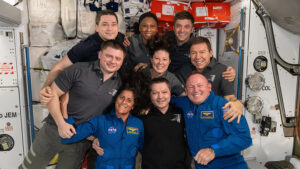A New Frontier of Health Risks
The International Space Station (ISS), a marvel of human engineering, is home to astronauts who push the boundaries of science and exploration. However, a new threat has emerged, raising serious health concerns. A superbug, Enterobacter bugandensis, has been discovered on the ISS, posing significant risks to astronauts, including Sunita Williams. This multidrug-resistant pathogen thrives in the unique environment of space, prompting urgent research to understand its implications and develop effective countermeasures.
The Superbug: Enterobacter Bugandensis
Discovery in an Unlikely Place
Enterobacter bugandensis, a pathogen commonly found in hospital settings on Earth, has made an unexpected appearance on the ISS. Researchers from the Indian Institute of Technology-Madras (IIT-Madras) and NASA’s Jet Propulsion Laboratory (JPL) have identified this superbug on various surfaces within the space station. The extreme conditions of space, such as microgravity, elevated radiation, and high carbon dioxide levels, have allowed this bacterium to not only survive but thrive, becoming a formidable threat to astronaut health.
Adaptation and Mutation in Space
Dr. Kasthuri Venkateswaran, a principal investigator at JPL, has led a groundbreaking study on E. bugandensis. The research revealed that the strains of this bacterium on the ISS have mutated, becoming genetically and functionally distinct from their Earth counterparts. These mutations have enhanced the pathogen’s resistance to multiple drugs, making it a significant challenge for astronauts and mission planners. The confined environment of the ISS, combined with the unique stresses of space, has accelerated the evolution of this superbug, highlighting the need for innovative health management strategies. www.newsreporto.com

Health Implications for Astronauts
A Unique Challenge in a Closed Environment
The presence of E. bugandensis on the ISS poses serious health risks for astronauts. This bacterium can infect the respiratory system, becoming more potent and harder to manage in the closed, artificial environment of the space station. The lack of natural air circulation and limited medical resources on the ISS exacerbate the threat, making infection control a top priority. The study indicates that the ISS environment fosters rapid microbial evolution, posing a unique challenge to astronaut health and mission success.
The Role of Space Conditions in Pathogen Persistence
Microgravity, high radiation levels, and elevated carbon dioxide are conditions that significantly affect microbial behavior. These factors contribute to the persistence and evolution of E. bugandensis on the ISS. Understanding how these conditions impact pathogen survival and adaptation is crucial for developing effective countermeasures. The research underscores the importance of continuous monitoring and innovative health strategies to mitigate the risks posed by such superbugs in space.

Research Collaboration and Findings
A Pioneering Study
The collaboration between IIT-Madras and JPL has brought together experts in data science, artificial intelligence, and microbiology. Professor Karthik Raman from IIT-Madras and Dr. Kasthuri Venkateswaran from JPL, along with their teams, have conducted an extensive study published in the journal *Microbiome*. Their findings reveal that E. bugandensis not only survives but thrives on the ISS, interacting with other microorganisms and potentially aiding their survival. This symbiotic relationship between benign microorganisms and opportunistic pathogens highlights the complex dynamics of microbial life in space.
Implications for Earth and Space
The insights gained from this study extend beyond the ISS. Understanding how benign microorganisms help pathogens like E. bugandensis adapt to extreme conditions can inform strategies to combat similar threats on Earth. The research emphasizes the need for effective preventive measures to protect health in closed, human-built environments. The knowledge gained from studying microbial behavior and evolution in space could lead to novel countermeasures against opportunistic pathogens, ensuring the safety of astronauts and enhancing our preparedness for future space missions.
Strategies for Mitigating Superbug Threats
Innovative Health Management
To address the threat of superbugs like E. bugandensis, innovative health management strategies are essential. Continuous monitoring of the ISS environment and regular screening of microbial populations can help detect potential threats early. Developing advanced disinfection technologies and implementing stringent hygiene protocols are crucial steps in preventing the spread of these pathogens. Additionally, research into the genetic and functional adaptations of superbugs in space can guide the development of targeted treatments and preventive measures.
Collaboration and Future Research
Ongoing collaboration between space agencies, research institutions, and healthcare organizations is vital for addressing the challenges posed by superbugs in space. By pooling resources and expertise, scientists can develop comprehensive strategies to protect astronaut health and ensure the success of long-duration space missions. Future research should focus on exploring the mechanisms of microbial adaptation in space and developing novel countermeasures to mitigate the risks posed by multidrug-resistant pathogens.

The discovery of Enterobacter bugandensis on the ISS highlights a new frontier of health risks for astronauts. As researchers from IIT-Madras and NASA’s JPL continue to investigate this superbug, their findings will play a crucial role in shaping our understanding of microbial behavior in space. The insights gained from this research will inform strategies to protect astronaut health, ensuring the safety and success of future space missions. By addressing the challenges posed by superbugs in space, we can enhance our preparedness for similar threats on Earth, safeguarding the health of both astronauts and the general population.

